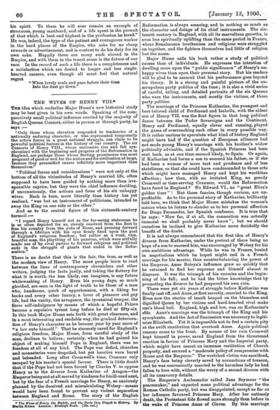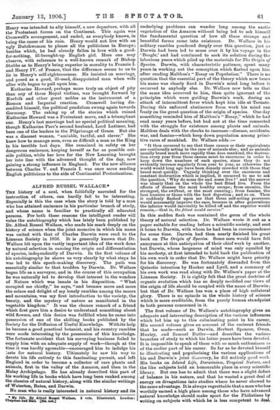THE WIVES OF HENRY VIII.• TErz idea which underlies Major
Hume's new historical study may be best given in his own words. Speaking of the com- paratively small political influence exerted by the majority of English Queens Consort, either in person or through party, he says :— " Only those whose elevation responded to tendencies of a nationally enduring character, or who represented temporarily the active forces in a great national struggle, can claim to be powerful political factors in the history of our country. The six Consorts of Henry VIII., whose successive rise and fall syn- chronised with the beginning and progress of the Reformation in England, are perhaps those whose fleeting prominence was most pregnant of good or evil for the nation and for civilisation at large, because they personified causes infinitely more important than themselves."
"Political forces and considerations" were not only at the bottom of all the vicissitudes of Henry's married life, often supposed to have been guided by nothing more than irre- sponsible caprice, but they were the chief influence deciding,
if unconsciously, the actions and fates of his six unhappy wives. Each in turn, more literally than history has yet
realised, "was but an instrument of politicians, intended to sway the King on one side or the other."
And as to the central figure of this sixteenth-century turmoil :—
"I regard Henry himself not as the far-seeing statesman he is so often depicted for us, sternly resolved from the first to free his country from the yoke of Rome, and pressing forward through a lifetime with his eyes firmly fixed upon the goal of England's religious freedom ; but rather as a weak, vain, boastful man, the plaything of his passions, which were artfully made use of by rival parties to forward religious and political ends in the struggle of giants that ended in the Refor- mation."
There is no doubt that this is the fair, the true, as well as the modern view of Henry. The more people learn to read between the lines of contemporary chroniclers and other writers, judging the facts justly, and taking the flattery for what it is worth, the less likely, one imagines, is any future whitewashing of Henry. Even his young days, so much glorified, are seen in the light of truth to be those of a man who, handsome, quick of apprehension, with a liking for
books and every other luxury, a lover of pleasure and gay life, had the vanity, the arrogance, the tyrannical temper, the fierce self-indulgence by means of which a hopeful Prince became a repulsive tyrant long before he died at fifty-six. In this book Major Hume sets forth with great clearness, and in a most interesting and readable way, the gradual deteriora- tion of Henry's character as he became year by year more of
"a law unto himself." That he sincerely cared for England's religious freedom, Major Hume, from careful study of the man, declines to believe; certainly, when he had gained his object of making himself Pope in England, there was no freedom at all of any kind. The Pope was defied, churches and monasteries were despoiled, but yet heretics were burnt and beheaded. Long after Cromwell's time, Cranmer only escaped by his master's special favour. There is little doubt that if the Pope had not been forced by Charles V. to oppose Henry as to the divorce from Katharine of Aragon—the Emperor being not at all moved by kindness for his ill-used aunt, but by the fear of a French marriage for Henry, so anxiously planned by the deceived and miscalculating Wolsey—means would have been found to prevent any violent separation between England and Rome. The story of the English
• The Wives of Henry the Bight's, and the Parts they Played in History. By Martin Hume. London : Eseleigh Nash. [18s. net. J
Reformation is always amazing, and in nothing so much as the character and doings of its chief instruments. The six- teenth century in England, with all its marvellous growths, is even less spiritually uplifting than the same period in France, where Renaissance heathenism and religious wars struggled on together, and the fighters themselves had little of religion but the name.
Major Hume calls his book rather a study of political causes than of individuals. He expresses the intention of dwelling more upon the " public significance" of Henry's un- happy wives than upon their personal story. But his readers will be glad to be assured that his performance goes beyond his theory. It is a strong and painful picture of the un- scrupulous party politics of the time ; it is also a vivid series of careful, telling, and detailed portraits of the six Queens who were the instruments, and mostly the victims, of those party politics.
The marriage of the Princess Katharine, the youngest and best-beloved child of Ferdinand and Isabella, with the eldest son of Henry VII. was the first figure in that long political dance between the Tudor Sovereigns and the Continent. Henry and Ferdinand, equally clever and cunning, played the game of overreaching each other in every possible way. It is rather curious to speculate what kind of history England might have had if the question of European alliances had not made young Henry's marriage with his brother's widow politically advisable, and if the Spanish Princess had been sent back, as at one time seemed likely, to Spain. Or again, if Katharine had borne a son to succeed his father, or if she had been a woman of more tact and prudence and of less stateliness, so that she could have condescended to those arts which might have managed Henry and kept his worthless affection ; how then, with no irritated King, no greedy Cromwell or time-serving Cranmer, would the Reformation have fared in England No Edward VI., no "great Eliza's golden time " ! But these fancies, though curious, are un- profitable. As to the personal story of Katharine, brilliantly told here, we think that Major Hume mistakes the woman's nature when he listens to slander as to her personal affection for Diego Fernandez, her Spanish confessor. It is true that he says : " How far, if at all, the connection was actually immoral we shall probably never know " ; but we should ourselves be inclined to give Katharine more decidedly the benefit of the doubt.
It is not always remembered that the first idea of Henry's divorce from Katharine, under the pretext of there being no hope of a son to succeed him, was encouraged by Wolsey for his own ambitious advantage. While he was in France, busied in negotiations which he hoped might end in a French marriage for his master, thus counterbalancing the power of the Emperor, Anne Boleyn's influence grew so quickly that he returned to find her supreme and himself almost in disgrace. It was the triumph of his enemies and the begin- ning of his fall; and he had the bitter knowledge that by promoting the divorce he had prepared his own ruin.
There were yet six years of struggle before Katharine was finally cast off, and Anne, at first secretly, married to the King. Even now the stories of insult heaped on the blameless and dignified Queen by her vicious and hard-hearted rival make one's blood boil. England, high and low, was on Katharine's side. Anne's marriage was the triumph of the King and his sycophants. And the Act of Succession was necessary to legiti- mise Elizabeth. Yet it is impossible not to feel a certain pity at the swift retribution that overtook Anne. Again political reasons came to the front. By means of her ruin Cromwell kept himself in power, saved England from the threatened reaction in favour of Princess Mary and the Imperial party, which might have meant an immense restitution of Church property, and secured a "moderate policy of compromise with Rome and the Emperor." The wretched victim was sacrificed, Henry's face being cleverly saved by accusations of treason, and he was conveniently married to the harmless lady he had fallen in love with, without the worry of a second divorce with all its unsavoury details.
The Emperor's Ambassador called Jane Seymour "the peacemaker," and expected some political advantage for the Roman Catholic party, but was disappointed, except so far as her influence favoured Princess Mary. After her untimely death, the Protestant tide flowed more strongly than before in the wake of Princess Anne of Cleves. By this marriage
Henry was intended to ally himself, a new departure, with all the Protestant forces on the Continent. This again was Cromwell's arrangement, and ended, as everybody knows, in being the cause of his ruin. Henry would not live with an ugly Dutchwoman to please all the politicians in Europe; besides which, he had already fallen in love with a good- for-nothing, ill-brought-up English girl. Here one may observe, with reference to a well-known remark of Bishop Stubbs as to Henry's being superior in morality to Francis I. and Henry IV. of France, that the difference seems to us to lie in Henry's self-righteousness. He insisted on marriage, and posed as a good, ill-used, disappointed man when wife after wife began to pall upon him.
Katharine Howard, perhaps more truly an object of pity than any of these Royal victims, was brought forward by Norfolk and other great nobles as the instrument of a
Roman and Imperial reaction. Cromwell having dis- credited himself, the political pendulum swung again towards Germany. The raking up of the stories which ruined Katharine Howard was a Protestant move, and a triumphant one. Henry's last marriage had no special political meaning, though Katharine Pares second husband, Lord Latimer, had been one of the leaders in the Pilgrimage of Grace. But she was a discreet woman, "amiable, tactful, and clever." She knew how to manage men, even so difficult a man as the King in his terrible last days. She remained in safety on her dangerous eminence, keeping herself as far as possible out- side politics, while her love for the New Learning brought her into line with the advanced thought of the day, now gaining a strong influence in England. For the new alliance between Charles V. and Francis I. was once more sending English politicians to the side of Continental Protestantism.











































 Previous page
Previous page